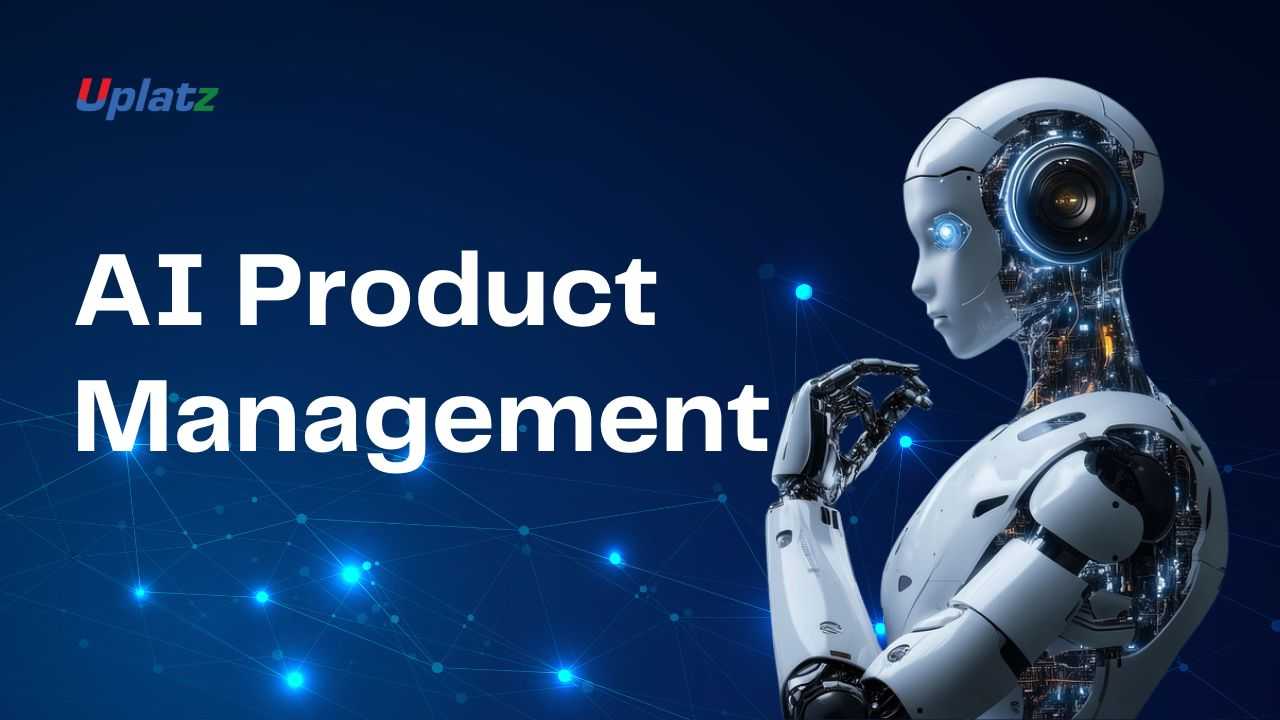AI Product Management
Master the skills to lead AI-driven products from strategy to launch with a balance of business, data, and ethics. Price Match Guarantee
Full Lifetime Access
Access on any Device
Technical Support
Secure Checkout
Course Completion Certificate
Price Match Guarantee
Full Lifetime Access
Access on any Device
Technical Support
Secure Checkout
Course Completion Certificate
 97% Started a new career
BUY THIS COURSE (
97% Started a new career
BUY THIS COURSE (GBP 12 GBP 29 )-
 87% Got a pay increase and promotion
87% Got a pay increase and promotion
Students also bought -
-

- Product Management
- 2 Hours
- GBP 12
- 33 Learners
-

- AI for Finance: Forecasting, Risk Scoring, and Portfolio Optimization
- 10 Hours
- GBP 12
- 10 Learners
-

- GenAI in Marketing: Campaigns, Content, and Customer Insights
- 10 Hours
- GBP 12
- 10 Learners

AI Product Management is rapidly emerging as one of the most critical and high-impact roles in the modern digital landscape. As Artificial Intelligence transforms how businesses operate—from automating workflows to enhancing decision-making and personalization—organizations are seeking professionals who can bridge the gap between business strategy, data science, and responsible innovation.
This Mastering AI Product Management Course by Uplatz equips you with the strategic, technical, and ethical foundations to lead AI-driven initiatives confidently. It combines core concepts of AI and Machine Learning with real-world case studies, product frameworks, and leadership principles, preparing you to manage AI products from ideation to scaling.
🔍 What is AI Product Management?
AI Product Management involves guiding the development and lifecycle of AI-powered products and services. Unlike traditional product management, it demands a deep understanding of data, algorithms, model behavior, and ethical implications.
An AI Product Manager (AI PM) must balance three core domains:
-
Business Goals: Define problems worth solving and link AI capabilities to measurable outcomes.
-
Technology and Data: Collaborate with data scientists, ML engineers, and developers to ensure model reliability and scalability.
-
User Experience & Ethics: Ensure transparency, fairness, and usability in AI-driven experiences.
AI PMs serve as the strategic connectors between cross-functional teams—aligning data pipelines, design principles, and regulatory frameworks to deliver human-centered, responsible AI products.
⚙️ How AI Product Management Works
AI Product Management blends product thinking with data-driven decision-making. Here’s how the workflow typically functions:
-
Opportunity Identification: Recognize where AI can deliver business or customer value.
-
Data Strategy: Assess data availability, quality, and governance for model training.
-
Model Design & Validation: Work with technical teams to ensure model fairness, explainability, and reliability.
-
MVP Development: Create minimal viable AI products and evaluate user feedback.
-
Deployment & Monitoring: Launch AI systems responsibly and measure ongoing performance using KPIs and feedback loops.
-
Scaling & Governance: Build frameworks for versioning, compliance, and continuous improvement.
Through this process, AI Product Managers act as translators between technical potential and strategic impact, ensuring AI solutions are practical, ethical, and aligned with business vision.
🏭 How AI Product Management is Used in the Industry
AI Product Management is driving transformation across industries:
-
Finance & Banking: Credit scoring, fraud detection, and personalized customer experiences.
-
Healthcare: Predictive diagnostics, treatment recommendations, and patient engagement tools.
-
Retail & E-commerce: Dynamic pricing, recommendation engines, and demand forecasting.
-
Media & Entertainment: Content curation, personalization, and generative storytelling.
-
Manufacturing & Logistics: Predictive maintenance, process automation, and optimization algorithms.
Tech leaders such as Google, Microsoft, Amazon, and Meta rely on skilled AI Product Managers to conceptualize and deploy AI systems that meet both technical excellence and user trust. This role is becoming indispensable for any organization adopting data and AI at scale.
🌟 Benefits of Learning AI Product Management
Mastering AI Product Management equips you with a strategic blend of technical literacy, leadership, and ethical judgment — skills increasingly demanded in top-tier organizations.
Key Benefits Include:
-
Career Advancement: Enter one of the most in-demand roles in the AI economy.
-
Strategic Thinking: Learn to connect AI capabilities with real business value.
-
Cross-Functional Leadership: Collaborate effectively with engineers, designers, and executives.
-
Responsible AI Knowledge: Build ethical, explainable, and compliant AI systems.
-
Data & Metrics Proficiency: Drive data-based decision-making across teams.
-
Future-Proof Skillset: Stay ahead as AI continues to redefine industries.
By learning AI Product Management, you not only enhance your professional versatility but also contribute to the responsible and sustainable evolution of AI technology.
📘 What You’ll Learn in This Course
This comprehensive course is designed to guide you through the full lifecycle of AI product development and management. You’ll learn to:
-
Understand AI, ML, and Generative AI fundamentals in a business context.
-
Define and evaluate AI opportunities that align with business strategy.
-
Build data strategies and model governance frameworks.
-
Design AI product roadmaps and prioritization matrices.
-
Apply human-centered design for AI-powered features.
-
Collaborate with technical teams on model performance, validation, and monitoring.
-
Manage the AI product lifecycle, from MVP to large-scale deployment.
-
Navigate AI ethics, regulations, and responsible innovation.
-
Anticipate future trends in AI adoption and product management.
Each module includes real-world case studies, interactive templates, and practical frameworks used by top AI product teams.
🧠 How to Use This Course Effectively
To get the most out of this course:
-
Begin with the Foundations: Review core AI and ML concepts and their business applications.
-
Relate Case Studies: Connect examples to your organization or industry.
-
Apply Frameworks: Use opportunity assessment and roadmap templates on real scenarios.
-
Collaborate Cross-Functionally: Practice exercises that simulate coordination between PMs, engineers, and data scientists.
-
Develop Your Own AI Roadmap: Create a capstone project that reflects your unique AI strategy.
-
Revisit Ethics Modules: Strengthen your understanding of transparency, fairness, and governance.
👩💻 Who Should Take This Course
This course is ideal for:
-
Aspiring Product Managers aiming to specialize in AI and data-driven products.
-
Experienced PMs transitioning to AI, ML, or analytics-based roles.
-
Business Leaders & Entrepreneurs integrating AI into their products and operations.
-
Data Professionals & Engineers seeking product and leadership perspectives.
-
Students & Graduates preparing for emerging roles in AI, product innovation, or digital transformation.
No deep technical coding background is required — just curiosity, critical thinking, and a desire to lead AI-driven change.
🧩 Course Format and Certification
The course is self-paced and structured into modules that blend theory with practical application. It includes:
-
HD video lectures with interactive case studies.
-
Downloadable frameworks, roadmaps, and templates.
-
Real-world assignments and role-based simulations.
-
Discussion boards for peer collaboration and networking.
-
Capstone project: Build your own AI product strategy or MVP plan.
Upon successful completion, you’ll receive a Course Completion Certificate from Uplatz, validating your knowledge in AI Product Management, strategy, and leadership.
🚀 Why This Course Stands Out
-
Comprehensive Coverage: Combines AI fundamentals with real-world product management practices.
-
Ethics & Governance Focus: Teaches responsible innovation and compliance.
-
Cross-Functional Frameworks: Learn how to manage AI projects across business and technical teams.
-
Leadership-Oriented: Build decision-making and communication skills for executive roles.
-
Career-Relevant Outcomes: Prepare for roles such as AI Product Manager, Product Strategist, or Innovation Lead.
This course equips you with the mindset and skillset to lead in the age of intelligent products — balancing technical feasibility, business goals, and societal responsibility.
🌐 Final Takeaway
As AI becomes integral to every industry, AI Product Managers are the catalysts driving responsible innovation and scalable impact. They combine strategic thinking, empathy, and technical literacy to transform algorithms into real-world solutions.
The Mastering AI Product Management Course by Uplatz gives you a structured path to becoming that bridge — capable of defining, launching, and scaling AI-powered products that create measurable business and human value.
Start today and become a leader in one of the most transformative and future-proof roles in technology.
By completing this course, learners will:
-
Gain business fluency in AI concepts and how they apply to products.
-
Lead cross-functional AI product teams.
-
Design AI product strategies aligned with business goals.
-
Manage data, ethics, and governance challenges.
-
Develop KPIs and success metrics for AI adoption.
-
Build confidence as an AI Product Manager for global organizations.
Course Syllabus
Module 1 – Foundations of AI for Business
-
Introduction: Why AI matters in business today
-
What AI is (and isn’t) – demystifying buzzwords
-
AI vs. ML vs. Generative AI explained simply
-
Myths & misconceptions about AI
-
AI across industries: banking, retail, healthcare, etc.
-
Case study: Netflix, Uber, or Amazon’s AI use
Module 2 – The Role of an AI Product Manager
-
Traditional PM vs. AI PM – what’s different
-
Core responsibilities of an AI PM
-
Required skills: business + data intuition + ethics
-
Working with cross-functional teams (DS, Eng, Legal, Ops)
-
Success metrics for AI product managers
-
Career path & opportunities in AI product management
Module 3 – Identifying AI Opportunities
-
How to recognize AI opportunities in your organization
-
Problem fit vs. AI fit – frameworks for evaluation
-
Feasibility vs. business value balance
-
Example: AI features in consumer apps vs. enterprise solutions
-
Common reasons AI products fail
-
Mapping customer pain points to AI-driven solutions
Module 4 – AI Product Strategy
-
What is AI product strategy?
-
Aligning AI initiatives with business goals
-
Build vs. Buy vs. Partner decisions
-
Roadmaps for AI products – how they differ
-
Competitive advantage through AI adoption
-
Case study: Amazon, OpenAI, or Tesla
Module 5 – Data as the Core of AI Products
-
Why data is the fuel of AI
-
Data quality and data readiness explained simply
-
Data acquisition strategies – internal vs. external
-
Privacy, compliance, and governance issues
-
The cost of poor data: business implications
-
Case study: biased AI system failures
Module 6 – Designing AI Products for Users
-
Human-centered AI design principles
-
Explainability, transparency, and trust in AI
-
Managing user expectations of AI systems
-
UI/UX design considerations for AI features
-
The “black box” problem explained to business leaders
-
Case study: ChatGPT’s UX evolution
Module 7 – Building and Scaling AI Products
-
AI product lifecycle explained (non-technical)
-
MVPs in AI – what’s different?
-
Collaboration with data scientists & engineers
-
Agile product management for AI projects
-
From pilot to production: scaling challenges
-
Case study: AI chatbot rollout in a bank/retail firm
Module 8 – Measuring Success in AI Products
-
Why traditional KPIs aren’t enough for AI
-
Measuring business impact vs. technical performance
-
Accuracy vs. adoption vs. ROI trade-offs
-
Customer trust & adoption as success metrics
-
Monitoring AI in production – continuous learning
-
Case study: AI in customer service (success & failure stories)
Module 9 – Monetization and Business Models of AI
-
AI-native vs. AI-enhanced products
-
Pricing strategies for AI (subscription, API, usage-based)
-
SaaS + AI business models
-
Cost of running AI products (compute, infra, talent)
-
Ecosystem strategies (platforms, partnerships)
-
Emerging business models with generative AI
Module 10 – Ethics, Risks, and Regulations
-
Ethical dilemmas in AI product management
-
Bias, inclusivity, and fairness explained simply
-
Risk management frameworks for AI
-
Regulatory landscape: EU AI Act, US/India/China approaches
-
Responsible AI as a competitive advantage
-
Case study: AI ethics failures (facial recognition, hiring bias)
Module 11 – The Future of AI Product Management
-
The evolution of AI product management role
-
Generative AI and LLMs shaping products
-
AI + IoT + Edge AI + Autonomous systems
-
Skills of the future AI PM
-
Organizational readiness for an AI-first world
-
Case study: Microsoft Copilot, Tesla Autopilot, etc.
Module 12 – Capstone & Case Studies
-
Recap: AI PM playbook
-
Case study 1: Success story (e.g., Spotify personalization)
-
Case study 2: Failure story (e.g., Microsoft Tay chatbot)
-
Framework to evaluate your own AI product idea
-
Reflection prompts & group exercise design
-
Closing thoughts: AI PM mindset shift for leaders
Learners will receive a Certificate of Completion from Uplatz, validating their expertise in AI Product Management. This certification demonstrates readiness for roles bridging business strategy, AI technology, and ethical leadership.
AI Product Management prepares learners for roles such as:
-
AI Product Manager
-
Product Leader (AI-driven organizations)
-
AI Program Manager
-
Business Strategist (AI adoption)
-
Entrepreneur / Startup Founder (AI-first products)
With AI adoption accelerating worldwide, skilled AI PMs are in demand across tech, finance, healthcare, retail, and startups.
-
What is the role of an AI Product Manager?
An AI PM balances business strategy, technical feasibility, and ethics, guiding AI products from idea to deployment. -
How is AI Product Management different from traditional PM?
AI PMs need data intuition, model understanding, and risk management beyond typical product ownership. -
What makes data critical in AI products?
AI performance depends on data quality, diversity, and governance. -
What are success metrics for AI products?
Beyond accuracy, AI PMs measure adoption, ROI, trust, and user satisfaction. -
What are common reasons AI products fail?
Poor data, lack of alignment with business goals, weak UX, or overpromising results. -
What is the “black box” problem in AI?
It refers to the lack of explainability in AI decisions, which impacts trust and adoption. -
How can AI PMs ensure ethical AI?
By applying fairness, inclusivity, transparency, and regulatory compliance frameworks. -
What is database branching in the context of AI product dev?
(Not applicable directly, but branching in AI PM means experimentation and iteration on product features.) -
How do AI PMs work with cross-functional teams?
They collaborate with data scientists, engineers, legal, design, and operations for holistic delivery. -
Where is AI PM most in demand?
Across tech, healthcare, retail, finance, autonomous systems, and generative AI startups.









